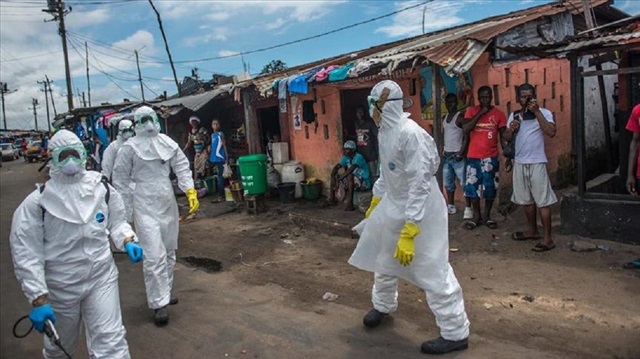
Thousands of young women who lost years of schooling after 2014's deadly pandemic now face stigmatization
The 2014 Ebola outbreak in West Africa devastated entire communities but even two years later some of those who survived the deadly pandemic are struggling with a new foe -- discrimination.
Many young women missed years of schooling as the authorities tried to bring the disease under control. Now that they are returning to once-closed school, the stigma of the disease has returned to haunt them -- simply because they fell pregnant during the outbreak.
“It was a wise health decision to ban schooling during the Ebola outbreak. But it opened doors to another problem," says Aminata Turay, a Sierra Leonean school pupil -- now aged 22 -- trying to complete her education.
Girls who became pregnant during the Ebola outbreak -- like Aminata -- are back in school thanks to advocacy campaigns by several human rights groups. But the girls are now faced with stigmatization.
Aminata and other young women who became pregnant during the Ebola outbreak were initially stopped from returning to school by a government regulation.
The law's authors thought allowing young pregnant women back into the classroom alongside other girls would create the impression it was acceptable to be pregnant while still being educated.
Aminata says the isolation and restrictions created by the Ebola panic led her to spending large amounts of time at home.
“I had to sit at home for over two years because of the outbreak and got pregnant during that period.
“A jobless student impregnated me and can't support my pregnancy," she told Anadolu Agency.
“I had to sell cold water to survive," she says. Her story is similar to many other girls of her age who got pregnant during the outbreak.
However, Aminata has returned to school in a determined frame of mind thanks to the numerous calls from rights groups who lobbied on the girls' behalf for them to be accepted back.
Aminata says: “My colleagues sometimes taunt me in several ways. Some say I am looking different because I am a mother and a student. It kills my morale sometimes. But I am very determined to be educated," she told Anadolu Agency.
Lack of Support
There is no official policy against discrimination and stigmatization in schools, making the issue more complex.
Mohamed Kamara is deputy director of education in the Moyamba district of southern Sierra Leone.
He accepts the issue of stigmatization is a key challenge. He told Anadolu Agency the authorities intensified public awareness-raising to make people realize the girls and Ebola survivors should not be stigmatized.
“It's normal and natural for such people to be taunted in our society. But we will keep on spreading the message," he said.
The psychological aspect of the girls is also a key concern. Guidance and counseling officer at the Ministry of Social Welfare, Mohamed Jabbie, says the girls and Ebola survivors need to be targeted with programs aiming at de-traumatizing them in order that they stay in school.
“They are in a state of trauma and need psychosocial support. We are trying to see that this is done very often," he told Anadolu Agency.
The closure of schools during the Ebola outbreak impacted on girls' education in the country in several ways.
Rights groups had already criticized the government for running an education system which often dragged out girls' schooling over many years. The outbreak of a seven-year civil war in 1997 also hit many girls' education.
Overall, the situation of over 4,000 Ebola survivors in the country is dire. In April this year, survivors protested in the capital Freetown over what they called a lack of government care and appealed for an end to discrimination.
Earlier this month, a group of Ebola survivors including Yusuf Kabba, head of the Sierra Leone Ebola Survivors' Association, and Social Welfare Minister Sylvia Olayinka Blyden visited the U.S. for a week to raise awareness of their struggles.
Kabba told Anadolu Agency their members were sometimes discriminated against in communities and sidelined at some events.
“We want more support as most of our colleagues are living a very desperate situation with no medical care, no good food and are barely trying to survive," Kabba said.
One female survivor is 48-year-old Mamusu Koroma of Kumala in the Koinadugu district, an area ravaged by Ebola.
“My husband divorced me last year after I survived the virus," she told Anadolu Agency. “I am only trying to survive and sometimes even my friends don't trust to come closer to me when I am sick with cold or 'flu.
“I survived Ebola, but its complications like these are still with me" she added.
Hello, the comments you share on our site are a valuable resource for other users. Please respect other users and different opinions. Do not use rude, offensive, derogatory, or discriminatory language.
The floor is all yours.








